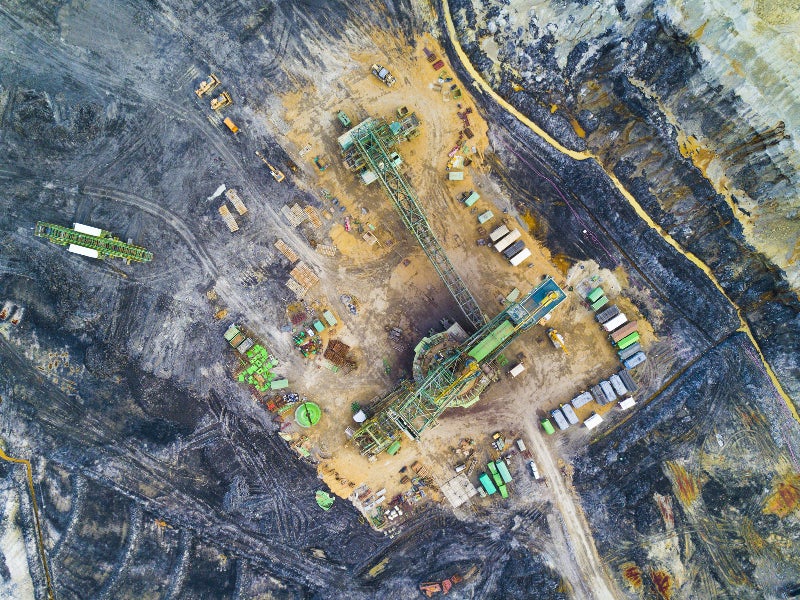Turow is a huge open-pit coal mine located outside Bogatynia in south-western Poland. Owned and operated by state-owned utility Polska Grupa Energetyczna (PGE), the coal mine has been producing for more than 115 years since 1904.
The mining license for the project has been extended multiple times ever since the Polish government acquired the mine in 1947.
The current operating license for the mine expires in March 2020, which PGE plans to renew until 2044 through an expansion of the existing huge open-pit mine.
The proposed expansion plan has sparked international controversy from the neighboring Czech Republic and Germany.
Turow coal mine location, geology and site details
The Turow lignite deposit encompasses 2487ha within the Turoszów brown coal basin in the Lower Silesian region of Poland, near the borders of the Czech Republic and Germany.
A coal-fired power plant named after the mine has been operating on a site adjacent to the Turow lignite mine since 1962. The current installed capacity of the Turow power plant, which is also owned and operated by PGE, is 1.5GW.
The power plant relies on coal supply from the Turow mine and is being expanded to reach 2GW installed capacity by 2020.
Reserves and annual production
The Turow mine is estimated to hold more than 700 million tonnes (Mt) of lignite in proven and probable reserves. The mine is capable of producing more than 20Mt of brown coal a year.
Turow is one of the four big lignite mines operating in Poland. The other three large lignite mining sites are Adamow and Konin mines in the Koni region and the Bechatow mine in south-central Poland that supplies coal to Europe’s biggest 4.4GW Bechatow lignite-fired power plant.
Turow coal mine expansion details
The Turrow mine expansion is expected to increase the total surface area of the pit to 30 km2 while extending the mining operation to just 70m from the Czech border. The depth of the expanded pit is expected to reach 330m beneath the surface.
The proposed expansion plan aims for sustained commercial-scale production at the mine until 2044.
Controversy surrounding the Turow lignite mine expansion
The Turrow mine expansion plan has triggered controversy from international civil society groups as well as the affected citizens of Poland, Czech Republic and Germany, since 2016.
The international environmental civil society organisations including Europe Beyond Coal, Greenpeace, Client Earth, Unfriend Coal Campaign, Ecological Association Eko-Unia urged insurance companies not to renew insurance contracts for the Turow lignite mine operations.
PGE was threatened to be sued, if it doesn’t phase out coal and switch to clean energy by 2030, ahead of the UN climate summit (COP24) held at Katowice, Poland, in December 2018.
In April 2019, hundreds of people from Poland, Czech Republic and Germany staged an international protest against Turow mine expansion, by forming a human chain on the Czech-Polish-German.
Opposition from the Czech Republic
In November 2019, the Ministry of the Environment of the Czech Republic, along with Czech’s Liberec Region authority and the Czech Geological Survey, issued a statement opposing the Turow mine expansion over potential environmental impacts of the project.
Apart from potential noise and air pollutions, an environmental study by the Czech authorities suggests that the Turow mine expansion will drain away groundwater from the Czech side and disrupt water supplies to approximately 30,000 people in the Liberec Region.
The Czech authorities have also set certain conditions if Poland decides to go ahead with the mine expansion.
The conditions include long-term monitoring of groundwater and noise levels, construction of a wall to prevent groundwater flow, and financial compensation for any potential damage.
The Czech authorities have also warned to file complaints in the European Union (EU) if Poland fails to meet the conditions.
Poland’s coal reliance
Poland generates 80% of its electricity from coal, and the country also relies heavily on coal for district heating. It is the biggest coal producer and the second-biggest coal consumer in Europe. Coal mining is one of the biggest employers in the country.
Poland was one of the four countries that didn’t sign into the EU pact in June 2019 to become carbon neutral by 2050. The other three countries including the Czech Republic, Hungary and Estonia were later persuaded to sign up for the pledge.
Poland is the only member country that has been exempted from the EU’s commitment to carbon neutrality by 2050.
Europe’s biggest coal consumer Germany has pledged to stop coal-based power generation by 2038, while Poland plans to phase out coal gradually with an aim to still rely on coal for 60% of its total energy consumption by 2040.





